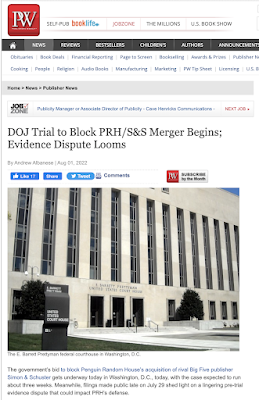As reported in Publishers Weekly and elsewhere, the trial to block or not block the merger of Penguin Random House with Simon and Schuster has begun. It's expected to last three weeks.
From the PW piece by Andrew Albanese,
“On November 25, 2020 Bertelsmann, the parent company of Penguin Random House, emerged as the winning bidder for Simon & Schuster from ViacomCBS for $2.175 billion. On November 2, 2021, the U.S. Department of Justice sued to block the acquisition.”
The Department of Justice's view is that “Penguin Random House’s proposed acquisition of Simon & Schuster would further entrench the largest publishing giant in the United States (and the world) and give the merged company control of nearly half of the market to acquire anticipated top-selling books from authors.”
Penguin Random House lawyers argue that “this acquisition will benefit readers, booksellers, and authors alike.”
The Authors Guild, in a position statement from November 2021, is against the merger, writing, “The proposed merger would enable the merged firm and the few competitors left to pay less and extract more from authors who often work for years at their craft before producing a book. By reducing author pay, the merger would make it harder for authors to earn a living by writing books, which would, in turn, lead to a reduction in the quantity and diversity of books—which subsequently harms consumers.”
Porter Anderson at Publishing Perspectives offers this analysis:
“In the States, antitrust challenges often are based on questions of monopolies—companies that become the sole or main providers of certain products or services. But this one is positioned by the Department of Justice as a question of what the government says is a risk of monopsony—in which a company might become the sole or main buyer of certain products or services. The question at its most simplistic level, then, becomes whether a PRH-S&S merger would create a company so large that it would control the vast majority of “top-selling” authors’ payments.”
It's important news to be aware of - will our US Publishing industry go down from a "Big Five" corporate publishers to a "Big Four"? Stay tuned...
Illustrate and Translate and Write On,
Lee


No comments:
Post a Comment